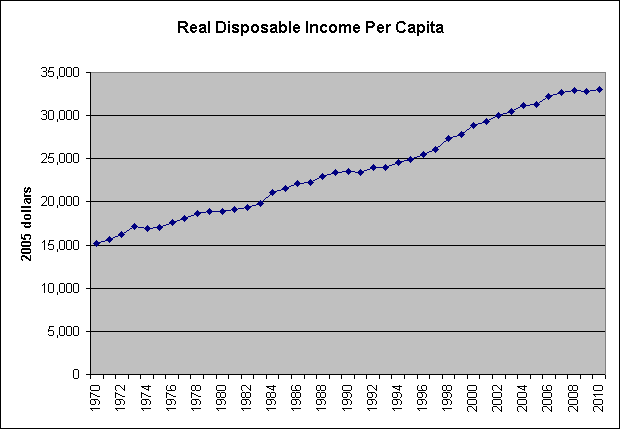March 21, 2011
The NYT treated us to this column from a recent college grad complaining about the prospect that he will be faced with higher taxes to pay for his parents’ and grandparents’ Social Security and Medicare. The idea that our children and grandchildren are going to be poorer on average than we are is a regular theme of much of the budget reporting and advocacy work (think Peter Peterson funded enterprises) that we see regularly.
It is of course absurd on its face, as all economists and budget analysts know. Real per capita disposable income has risen at average rate of just under 2.0 percent year as shown in the chart below.

Source: Bureau of Economic Analysis.
All projections show that real per capita disposable income will continue to rise, meaning that future generations will on average be richer than we are today and much richer than our parents and grandparents’ generations. Of course there is an issue of inequality, if most of the gains from growth go to the Goldman Sachs-Mark Zuckerberg types, then most today’s children may not be much better off than their parents and grandparents, but that is an issue of inequality within generations, not between generations.
However there is a simple remedy for the sort of whining about inter-generational equity that the NYT treated readers to this morning. We can add a box on tax returns to allow for a generational equity adjustment. Anyone who feels that their generation has gotten a bad deal can check the box and indicate the birth year of when they think people got a better deal. (The year entered must be earlier than their actual birth year). They will then have their taxes adjusted so that they have the same after-tax income of someone at the same income percentile as the year they chose.
This means that if the 24 year-old featured in today’s NYT thinks he has a bad deal in life and that people born 30 years before him got a better deal, then he just checks the box on his tax form and puts in the 1957. Suppose that he is in the 90th percentile of income for people who aer 24 in 2011. He would then have his taxes adjusted so that he would have the same real after-tax income as a 24 year-old at the 90th percentile in the income distribution in 1981.
In this case it would mean a large cut in after-tax income (those at the 90th percentile have done pretty well over the last three decades), but at least our NYT column writer will know that his generation has been treated fairly. This CEPR fix for generational equity will both help to reduce the budget deficit and silence the generational equity whiners. They just check a box on their tax returns and will have what they want. How’s that for a win-win?






